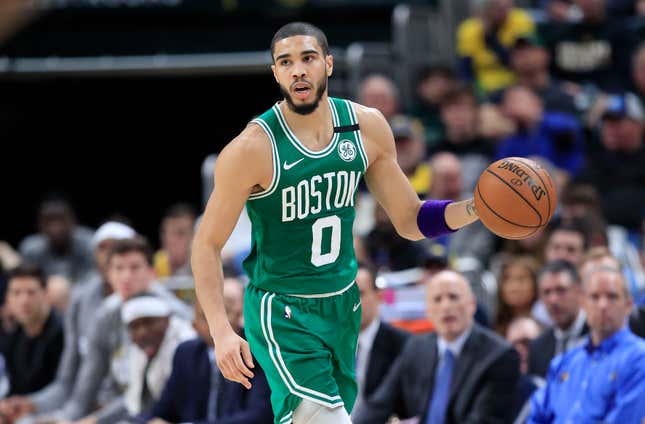
Dismissing the severity of COVID-19 is a dangerous game.
There are those who believe the virus is merely an inconvenience, an impediment that’s robbed them of cookouts and day parties. But for millions of others, it’s either been an outright death sentence or has significantly impacted their day-to-day lives.
Being a professional athlete is already demanding enough on the human body, and when you sprinkle a little COVID-19 into the mix, you can end up with some unfortunate results. For over a year now, we’ve heard horror stories of long haulers who beat the virus yet still suffer from lingering symptoms for months afterward. And despite people like Boston Celtics forward Jayson Tatum being in peak physical condition, he revealed that he continues to suffer complications of his own.
In January, the two-time All-Star tested positive for the coronavirus. He would return to action three weeks later, but was noticeably impacted by the effects of the virus.
“Just running up and down the court a few times, it’s easier to get out of breath or tired a lot faster,” Tatum told reporters in February. “I’ve noticed that since I’ve had COVID. It’s just something I’m working on. It’s gotten better since the first game I played, but I still deal with it from time to time.”
The 23-year-old’s struggles with fatigue were obvious, as he shot only 39.7 percent from the floor in February. Thankfully, as his body continues to mend, he’s resumed playing at an elite level. On Tuesday night, he scored 32 points and sealed the Celtics’ win with a nasty three in the game’s final seconds. He’s also averaging 29 points a game in April, a month in which he has yet to score less than 20 and that also includes a career-high 53 points against the Timberwolves.
But while all might appear to be well and good, that isn’t exactly the case. The All-Star admitted that as he continues to recover, he’s had to rely on using an inhaler—something he never did prior to his COVID-19 diagnosis.
“It’s a process. It takes a long time,” he told reporters on Tuesday. “I take an inhaler before the game since I’ve tested positive. This has kind of helped with that and opened up my lungs, and, you know, I never took an inhaler before. So that’s something different.”
He also shared that he feels much better than he has previously and is “very close” to resuming his peak form.
“I for sure feel better now than I did a month ago,” Tatum said.
It’s been a difficult season for sure, as players returned to work after only a 72-day offseason—the shortest in NBA history—and have faced an increased risk of injury due to minimal rest, have had to deal with the coronavirus, and the psychological challenge of playing at the best of your ability in vacant areas.
All of these have factored into the Celtics’ disappointing record (29-26), but Tatum remains optimistic.
“I don’t think our record shows what kind of team that we are,” Tatum said. “I think even though it’s been a weird year, obviously we’ve dealt with some, excuse me, a bunch of things obviously. Stuff, a lot of guys tested positive, certain guys have been injured. But you know right now for the most part, we’re missing Evan [Fournier due to COVID-19 protocols].”
In time, studies will provide us with much more insight as we continue to learn about the long-term effects of the coronavirus, but in the interim, please try your best to remain safe.

